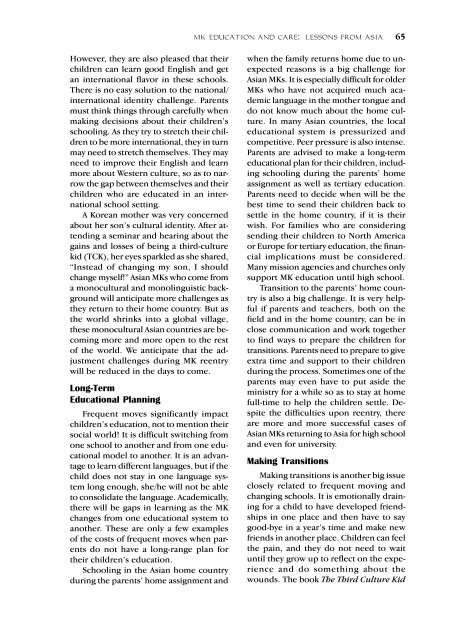Part 2 Regional Issues and Insights - World Evangelical Alliance
Part 2 Regional Issues and Insights - World Evangelical Alliance
Part 2 Regional Issues and Insights - World Evangelical Alliance
Create successful ePaper yourself
Turn your PDF publications into a flip-book with our unique Google optimized e-Paper software.
mk education <strong>and</strong> care: lessons from asia 65<br />
However, they are also pleased that their<br />
children can learn good English <strong>and</strong> get<br />
an international flavor in these schools.<br />
There is no easy solution to the national/<br />
international identity challenge. Parents<br />
must think things through carefully when<br />
making decisions about their children’s<br />
schooling. As they try to stretch their children<br />
to be more international, they in turn<br />
may need to stretch themselves. They may<br />
need to improve their English <strong>and</strong> learn<br />
more about Western culture, so as to narrow<br />
the gap between themselves <strong>and</strong> their<br />
children who are educated in an international<br />
school setting.<br />
A Korean mother was very concerned<br />
about her son’s cultural identity. After attending<br />
a seminar <strong>and</strong> hearing about the<br />
gains <strong>and</strong> losses of being a third-culture<br />
kid (TCK), her eyes sparkled as she shared,<br />
“Instead of changing my son, I should<br />
change myself!” Asian MKs who come from<br />
a monocultural <strong>and</strong> monolinguistic background<br />
will anticipate more challenges as<br />
they return to their home country. But as<br />
the world shrinks into a global village,<br />
these monocultural Asian countries are becoming<br />
more <strong>and</strong> more open to the rest<br />
of the world. We anticipate that the adjustment<br />
challenges during MK reentry<br />
will be reduced in the days to come.<br />
Long-Term<br />
Educational Planning<br />
Frequent moves significantly impact<br />
children’s education, not to mention their<br />
social world! It is difficult switching from<br />
one school to another <strong>and</strong> from one educational<br />
model to another. It is an advantage<br />
to learn different languages, but if the<br />
child does not stay in one language system<br />
long enough, she/he will not be able<br />
to consolidate the language. Academically,<br />
there will be gaps in learning as the MK<br />
changes from one educational system to<br />
another. These are only a few examples<br />
of the costs of frequent moves when parents<br />
do not have a long-range plan for<br />
their children’s education.<br />
Schooling in the Asian home country<br />
during the parents’ home assignment <strong>and</strong><br />
when the family returns home due to unexpected<br />
reasons is a big challenge for<br />
Asian MKs. It is especially difficult for older<br />
MKs who have not acquired much academic<br />
language in the mother tongue <strong>and</strong><br />
do not know much about the home culture.<br />
In many Asian countries, the local<br />
educational system is pressurized <strong>and</strong><br />
competitive. Peer pressure is also intense.<br />
Parents are advised to make a long-term<br />
educational plan for their children, including<br />
schooling during the parents’ home<br />
assignment as well as tertiary education.<br />
Parents need to decide when will be the<br />
best time to send their children back to<br />
settle in the home country, if it is their<br />
wish. For families who are considering<br />
sending their children to North America<br />
or Europe for tertiary education, the financial<br />
implications must be considered.<br />
Many mission agencies <strong>and</strong> churches only<br />
support MK education until high school.<br />
Transition to the parents’ home country<br />
is also a big challenge. It is very helpful<br />
if parents <strong>and</strong> teachers, both on the<br />
field <strong>and</strong> in the home country, can be in<br />
close communication <strong>and</strong> work together<br />
to find ways to prepare the children for<br />
transitions. Parents need to prepare to give<br />
extra time <strong>and</strong> support to their children<br />
during the process. Sometimes one of the<br />
parents may even have to put aside the<br />
ministry for a while so as to stay at home<br />
full-time to help the children settle. Despite<br />
the difficulties upon reentry, there<br />
are more <strong>and</strong> more successful cases of<br />
Asian MKs returning to Asia for high school<br />
<strong>and</strong> even for university.<br />
Making Transitions<br />
Making transitions is another big issue<br />
closely related to frequent moving <strong>and</strong><br />
changing schools. It is emotionally draining<br />
for a child to have developed friendships<br />
in one place <strong>and</strong> then have to say<br />
good-bye in a year’s time <strong>and</strong> make new<br />
friends in another place. Children can feel<br />
the pain, <strong>and</strong> they do not need to wait<br />
until they grow up to reflect on the experience<br />
<strong>and</strong> do something about the<br />
wounds. The book The Third Culture Kid
















